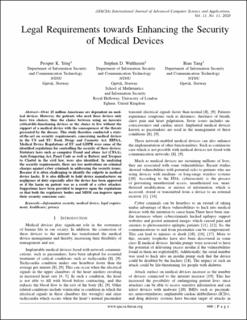Legal requirements toward enhancing the security of medical devices
Peer reviewed, Journal article
Published version

View/
Date
2020Metadata
Show full item recordCollections
Original version
International Journal of Advanced Computer Science and Applications (IJACSA). 2020, 11 (11), 666-675. 10.14569/IJACSA.2020.0111181Abstract
Over 25 million Americans are dependent on medical devices. However, the patients who need these devices only have two choices, thus the choice between using an insecure critical-life-functioning devices or the choice to live without the support of a medical device with the consequences of the threats presented by the disease. This study therefore conducted a stateof-the-art on security requirements, concerning medical devices in the US and EU. Food, Drugs and Cosmetic Act, HIPAA, Medical Device Regulations of EU and GDPR were some of the identified regulations for controlling the security of these devices. Statutory laws such as computer Fraud and abuse Act (CFAA), Anti-Tempering Act, Panel Code as well as Battery and Trespass to Chattel in the civil law, were also identified. In analyzing the security requirements, there are less motivations on criminal charges against cyber criminals in addressing the security issues. Because it is often challenging to identify the culprits in medical device hacks. It is also difficult to hold device manufactures on negligence of duty especially after the device has been approved or if the harm on patient was as a result of a cyber attacker. Suggestions have been provided to improve upon the regulations so that both the regulatory bodies and MDM can improve upon their security conscious care.
